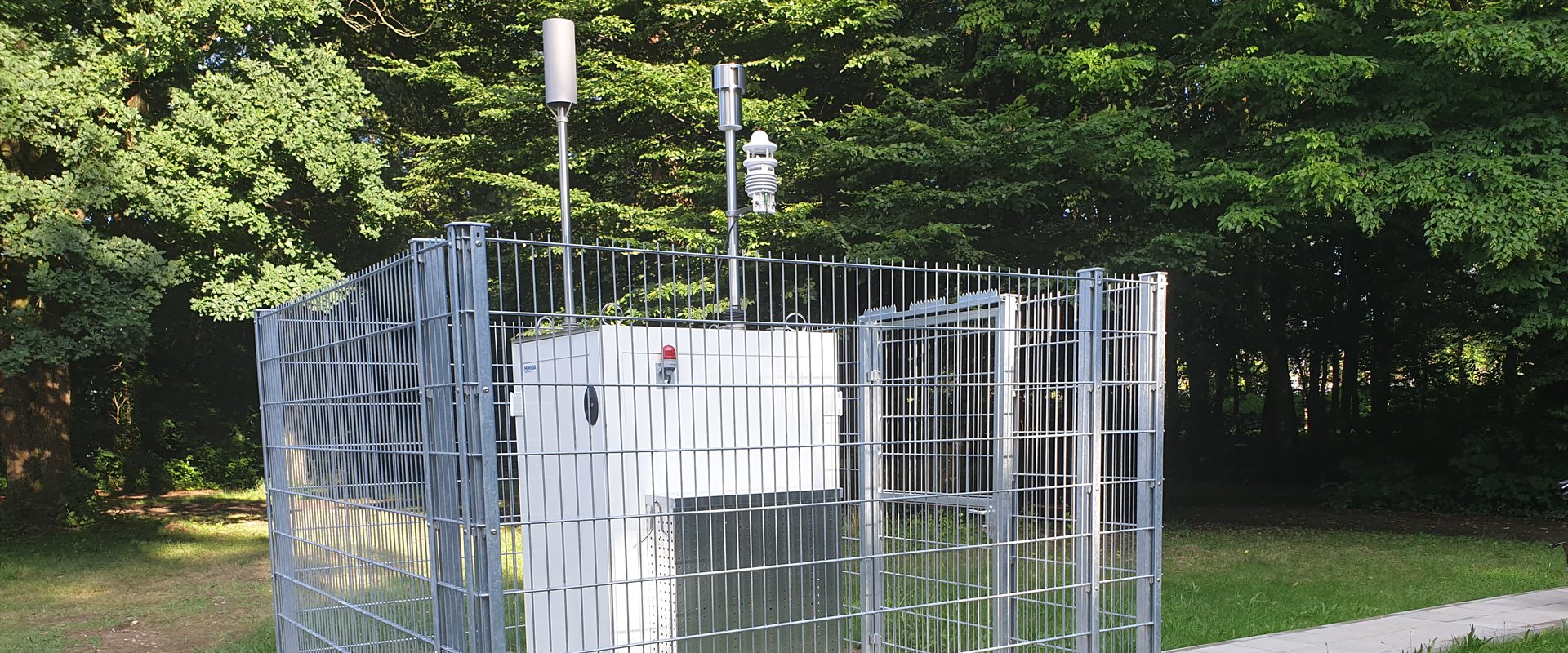Atmospheric Exposure Monitoring Network (AEMN)

The measurement system of the Chair of Regional Climate Change and Health consists of a stationary air and climate measurement station, which is located on the premises of the University Hospital, and mobile as well as compact low-cost measurement sensors. The resulting air-hygienic and climatic data allow for a variety of research approaches that investigate the impact of environmental changes on health.
Atmospheric Exposure Monitoring Station (AEMS)
Air and Climate Measurement Station of the Chair of Regional Climate Change and Health, Medical Faculty of the University of Augsburg
The research focus Environment and Health of the University Medical Center Augsburg focuses on positive and negative influences of the environment on health. This research is also greatly influenced by climate change, which leads to major changes in the environment that have a direct impact on the health of the population. Environmental factors play a role in a number of diseases such as respiratory diseases and cardiovascular diseases such as heart attack and stroke. Air-hygienic and climatic information on a regional and local scale is linked to observations from clinical patient care in order to further develop diagnosis and therapy of diseases as well as preventive health measures.
Air and climate data measured with the help of this station:
Air constituents:
Ozone (O3), nitrogen oxides (NO, NO2, NOx), carbon monoxide (CO), fine dust (Particulate Matter PM1, PM2.5, PM4, PM10, PMtot).
Meteorological variables:
Air temperature, relative humidity, precipitation intensity, precipitation type, precipitation amount, air pressure, wind direction and wind speed.
Atmospheric Exposure low cost Monitoring AELCM




The analysis of the relationships between climate, air constituents and health usually focuses on urban environments due to elevated inner-city temperatures, higher levels of air pollution and higher numbers of people exposed to these environmental factors compared to rural areas. Ongoing urbanization, demographic aging and climate change lead to increased vulnerability, mediated by climatic extremes and air pollution. It should be noted that systematic analyses of specific local characteristics of health-related atmospheric conditions and air composition in urban environments are still very rare due to the lack of high-resolution observation networks. In recent years, low-cost sensors have been developed which potentially offer the possibility to detect atmospheric conditions at high spatial resolution and to monitor them at sites of exposed population.
Measuring box Atmospheric Exposure Low-Cost Monitoring (AELCM)
Cost-effective, prefabricated and modified enclosures with 3D-printed parts are the basis of our easy-to-assemble AELCM box, which protects our selected sensors from harmful environmental influences. The dimensions of the ABS enclosure are 37x27x15cm. We use active ventilation to supply the sensors with ambient air and numerical flow simulations to evaluate the ventilation process. The sensors are used modularly in plug-in cards to allow easy and fast repair in case of malfunction and to provide additional stability and reliability in mobile measurement campaigns. The measurement box can be operated either by mains power or by the built-in rechargeable batteries, which take over seamlessly in case of mains power failure. The data transfer to our server takes place in real time via an LTE-M communication module. Wireless data transfers in near proximity to the measurement boxes is possible using an internal FTP server, which is a feature of every AELCM box.
You can find more information here.

Student or research assistant wanted!
Working hours:
30-40 hours/month
Your tasks:
- assistance in building a low-cost sensor network for the air pollution monitoring
- assistance in the technical design and crafting of measurement devices
Your profile:
- Student in (Electrical) Engineering, Physics, Design or similar with an interest in electrical engineering
- Basics or interest in CAD/3D-Printing/PCB-Design
- Experiences with microcontroller boards (e. g. Arduino, Pycom) are welcome
- Know-How in soldering is welcome
- An independent, structured, precise and results-oriented work ethos
Homeoffice is possible. However, as the job entails a bunch of lab work heavily reliant on in-house devices (e. g. 3D-Printer, soldering station), working occasionally in the lab is inevitable. Travel expenses which result from lab work can possibly be refunded. A PC workstation with CAD software (e. g. OpenSCAD, Autodesk Fusion 360, FreeCAD) is available and can also be used remotely.
For more details click here.
If interested, please contact: paul.gaebel@med.uni-augsburg.de
